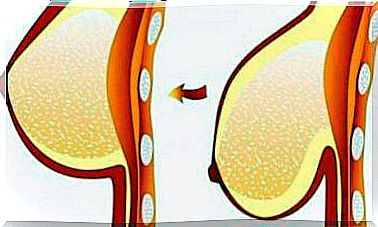5 Simple Steps To Overcome An Anxiety Attack
An anxiety attack can appear at any time, usually in the face of adversity. We must therefore have relaxation techniques that allow us to feel good and calm down quickly.

No one is exempt from the irrational fears that can attack our organism in unpredictable ways.
In addition, it is necessary to know that one anxiety attack often leads to others. Once the process is started, it is very difficult to stop it.
If you find yourself in this situation, do not hesitate to seek professional help.
Keep in mind that a psychologist can give you strategies to deal with these situations. It will help you understand the origin of your anxiety, to tackle the root of the problem.
From our side, we will give you 5 keys to be able to fight against this phenomenon.
However, we want to make one thing clear. We are all different and we need to find our own strategies to deal with our personal needs.
1. Understand what an anxiety attack is
This first step is essential. When we have to deal with a specific problem, it is essential to know what triggers it.
- Realize one thing, even if it may seem difficult to you: an anxiety attack is not going to cost you your life.
- It is a very common condition in the world population, usually triggered by an excess of adrenaline in the blood stream.
- These crises are caused by fears. Fears that are irrational, the origin of which we rarely know and which are very difficult to control.
It is interesting to know that anxiety is a natural and instinctive defense system, which prepares us for a danger that we have just identified.
This reaction allowed us to survive in the past, to escape our predators. Nowadays, even if we no longer have predators to speak of, it is the complexity of our society and our lives that triggers this defense mechanism.
2. Recognize the symptoms of an anxiety attack

An anxiety attack is like a detonation.
Let us take a concrete example. Marie is a 42 year old, professionally successful woman who has three children, a husband and a dependent parent.
- On the surface, his main problems are his professional and family responsibilities. She has always managed to lead this double life at the same time but, when she did not expect it, she begins to suffer from anxiety attacks.
- Sometimes when she goes to work, other times when she talks with her husband or children.
- Her father died two years ago, and although this event was traumatic for her, she believed she had overcome it.
However, she just lost her pet, and all the pain of her past has just resurfaced.
As we can see, his life forms a very complex whole, marked by stress, pressure, successive bereavements, etc.
Marie’s crises come closer and closer, but her doctor has taught her to recognize the first symptoms of their manifestation, in order to be able to react in time.
- Tachycardia,
- Negative thoughts
- The feeling that her heart will stop
- Some difficulty in breathing,
- Stomach aches,
- Dizziness,
- Excessive sweating.
3. Breathe
Breathing control is very important in controlling and stopping an anxiety attack.
We must not forget that this response of our mind to the perception of danger is above all physical and organic.
This is why we must try to regulate our breathing to control the runaway heart rate.
As soon as you perceive the first signs of an anxiety attack, seek a quiet place, remove the clothes which oppress you (take off your jacket, undo a button of your pants, sit down…).
- Inhale for 5 seconds.
- Hold your breath for 7 seconds.
- Exhale for 8 seconds.
Repeat this breathing cycle for 5 minutes.
4. Get rid of your negative thoughts
Negative thoughts flow into our minds when we are having an anxiety attack. It is as if we are opening the door to a real hurricane.
Learn how to stop this torrent of negativity. Say “no” to those thoughts and take back control of your mind. Using visualization techniques can help you a lot.
- Negative thoughts are like burning candles.
- Take a deep breath and breathe out to turn them off, one by one, without forgetting any.
In this way, you are continuing the breathing exercise that we told you about above, but adding to it the visualization of your inner demons, which will allow you to take back control of your mind.
5. Use soothing phrases
We should all have our own phrases, but to start you can use the list below whenever you feel like you are totally losing control of your mind during an anxiety attack.
- “Everything is fine, I will calm down, my mind is in balance”.
- “It’s all over, I’m safe, nothing can hurt me”.
- “Stop, take control, calm down immediately and take back the reins”.
- “Nothing is going to happen to me, I just have to breathe and trust myself”.
The strategies we just gave you are very basic, but they are fundamental. Once you have mastered them, do not hesitate to develop your own, in accordance with your personality and your needs. They will be of great help to you.









